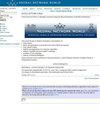Working memory, impulsivity and emotional regulation correlates with frontal asymmetry of healthy young subjects during auditory session
IF 0.9
4区 计算机科学
Q4 COMPUTER SCIENCE, ARTIFICIAL INTELLIGENCE
引用次数: 0
Abstract
Background : Specific frequency oscillations provide idea about functioning of underlying brain regions. Brain oscillations and event based assessment of cognitive functions like working memory (WM), impulsivity (Imp) and emotional regulation (ER) were reported to influence each other in different ethnic groups. But how these traits are regulated in healthy Indian adults was not explored widely. Aims: We analyzed link between scalp electrical activity and different neuropsychological traits in higher education aspirants. Method: All the traits were self-assessed using standard questionnaires. QEEG was performed during an audio-sensory session. Tracings collected through BESS software were analyzed using SPSS. Results: Less impulsive individuals exhibited higher frontal theta and beta activity. Higher frontal theta activity was associated with higher ER, whereas higher theta and alpha activity showed association with WM deficit. Individuals with higher Imp and happiness exhibited higher frontal hemispheric asymmetry for theta and alpha, while those with lower asymmetry for alpha and beta activity showed higher ER. Beta asymmetry was positively related with happiness. Conclusions: We infer that variability in behaviour of healthy adults is influenced by differential frontal brain impulses and could be considered for providing individualized assistance to emotionally vulnerable individuals.听觉过程中工作记忆、冲动和情绪调节与大脑额叶不对称相关
背景:特定的频率振荡提供了关于潜在大脑区域功能的想法。脑振荡和基于事件的认知功能评估,如工作记忆(WM)、冲动(Imp)和情绪调节(ER),在不同的种族中相互影响。但这些特征在健康的印度成年人中是如何调节的,并没有得到广泛的探讨。目的:分析高等教育上升者头皮电活动与不同神经心理特征之间的关系。方法:采用标准问卷自评。QEEG在声觉过程中进行。通过BESS软件收集的跟踪数据用SPSS进行分析。结果:较少冲动的个体表现出较高的额叶θ和β活动。较高的额叶θ活动与较高的ER相关,而较高的θ和α活动与WM缺陷相关。Imp和快乐程度较高的个体表现出较高的θ和α脑半球不对称,而α和β脑半球不对称程度较低的个体表现出较高的ER。不对称与幸福感呈正相关。结论:我们推断,健康成年人的行为变异性受到不同额叶脑脉冲的影响,可以考虑为情绪脆弱的个体提供个性化的帮助。
本文章由计算机程序翻译,如有差异,请以英文原文为准。
求助全文
约1分钟内获得全文
求助全文
来源期刊

Neural Network World
工程技术-计算机:人工智能
CiteScore
1.80
自引率
0.00%
发文量
0
审稿时长
12 months
期刊介绍:
Neural Network World is a bimonthly journal providing the latest developments in the field of informatics with attention mainly devoted to the problems of:
brain science,
theory and applications of neural networks (both artificial and natural),
fuzzy-neural systems,
methods and applications of evolutionary algorithms,
methods of parallel and mass-parallel computing,
problems of soft-computing,
methods of artificial intelligence.
 求助内容:
求助内容: 应助结果提醒方式:
应助结果提醒方式:


